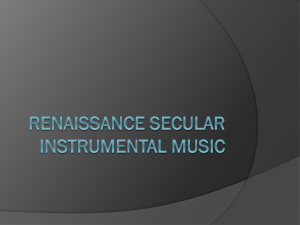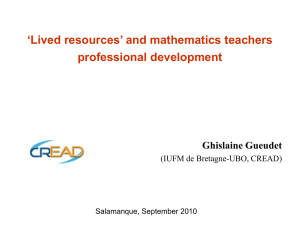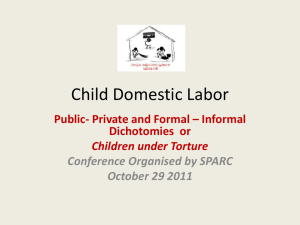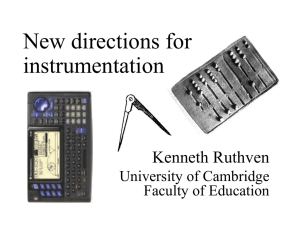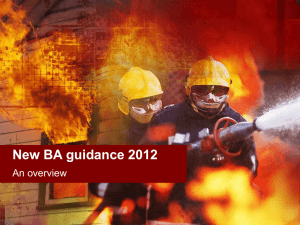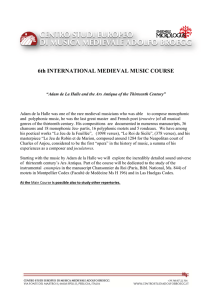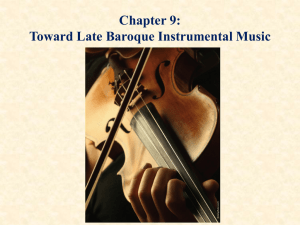instrumental - Educmath
advertisement
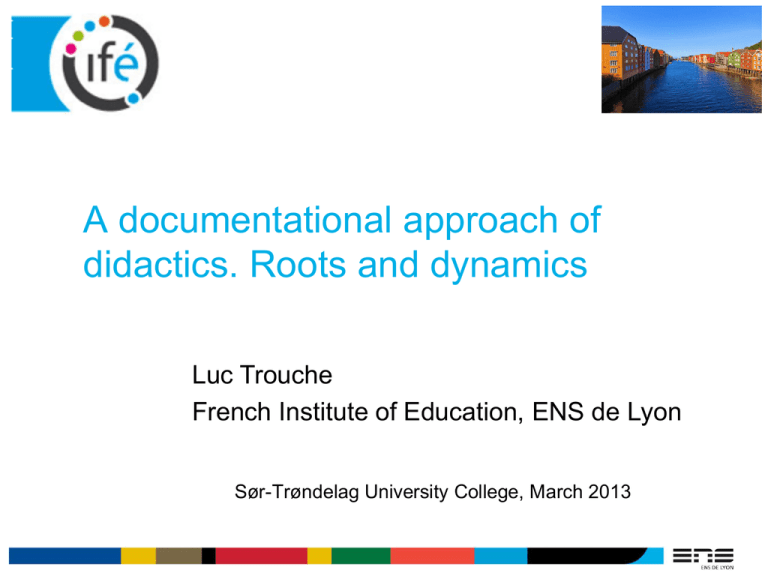
A documentational approach of didactics. Roots and dynamics Luc Trouche French Institute of Education, ENS de Lyon Sør-Trøndelag University College, March 2013 As a beginning… Plan • • • • Instrumental approach, potential and weakness Taking into account teacher’s role in orchestrating learning situations Understanding the true role of teachers in a changing digital world Crossing theoretical frameworks, towards a documentational approach of didactics • Questions and current research The instrumental approach (Guin & Trouche 1999), motivated by: • The rapid evolution and proliferation of tools in mathematics classroom; • Their influence on both students activity and conceptualisation. An approach rooted in Vygotski theory (the word artefact situates human activity in a world of culture and history) and in Piaget theory (the notion of scheme). A developmental approach of learning Instrumental genesis Once upon a time… An artefact A subject Instrumentation Instrumentalisation An instrument = a part of the artefact + utilisation scheme Artefacts Mains results Instrumental geneses The fruitful notion of system of instruments (from a system of tasks and a set of artefacts) A focus on instrumentation Instrumentalisation: underestimated The unexpected complexity and diversity of instrumental geneses Where is the teacher? A subject Instrumentation Instrumentalisation Instruments = part of artefacts + utilisation schemes Orchestration! The idea of necessary external steering of students instrumental geneses, to help the construction of efficient instrument systems An instrumental orchestration is defined by didactic configurations (i.e., the layout of the artifacts available in the environment, with one layout for each stage of the mathematical treatment) and by exploitation modes of these configurations (Trouche 2004) For the teacher: need for meta artifacts, for new resources (a lot of them provided by Internet) Understanding the role of teachers in the digital age Google to know himself/herself • Sesamath Changes of words, or paradigm shift? From an instrumental to a documentational approach of didactics, from dialectic artefact / instrument to dialectic resources / document • Taking into account major technological developments • Hybridization with an approach coming from the field of information architecture (Pedauque 2006) and curriculum material (Remillard 2005) • An deeper understanding of concepts as instrumentalisation, geneses, emerging of new concepts (resource systems) Changes of words, or paradigm shift? From an instrumental to a documentational approach of didactics, from dialectic artefact / instrument to dialectic resources / document • Taking into account major technological developments • Hybridization with an approach coming from the field of information architecture (Pedauque 2006) and curriculum material (Remillard 2005) • An deeper understanding of concepts as instrumentalisation, geneses, emerging of new concepts (resource systems) Change of words, or paradigm shift? From an instrumental to a documentational approach of didactics, from dialectic artefact / instrument to dialectic resources / document • Taking into account major technological developments • Hybridization with an approach coming from the field of information architecture (Pedauque 2006) and curriculum material (Remillard 2005) • An deeper understanding of concepts as instrumentalisation, geneses, emerging of new concepts (resource systems) As a conclusion… • • • • • Half baked theories as boundary objects (Kynigos) A "good distance" between theories, provided fruitful crossovers? Hybridization (crossbreeding) requires successful theoretical reasons to be (= problem solving) and a long companionship The theoretical diversity as a condition of scientific development Beyond ... For a plurality of scientific approaches ... As a conclusion… Recursos relacionados: - Por su pertenencia a un mismo directorio - Por su participación en la misma situación - Debido a que son controlados por el mismo conocimiento profesional Schematic Representation of Resource system First appointment Discussion of methological tools and agenda of the follow up Guided visit of the resources “Instruction to the double” SRRS Week 1 Observation of a lesson (videotaped) Interview just before and after Week 2 Autoconfrontation with the video Back to resources and SRRS Week 3 Logbook Date Place Actors Objectives Resources used Resources Storage, produced reorganisation Interaction Documentation Logbook (CDL) Individual questions… Three teachers collectives IDL Community Documentation Logbook (CDL) CDL CDL One community of practice Effects on the documentation of a teacher through her interactions with different collectives (Hammoud et al. 2010) CDL Student (vs Teacher) Class Logbook (SCL/TCL) SCL Follow up of the design of an online textbook by a Sesamath working group, analysis of the interactions between individual and collective documentation work (Sabra & Trouche, to be published) TCL A class SCL Effects of the joint action of a teacher and her students on her resource system (Aldon 2011) Interaction Documentation Logbook (CDL) Collective questions… Three teachers collectives IDL Community Documentation Logbook (CDL) CDL CDL One community of practice Effects on the documentation of a teacher through her interactions with different collectives (Hammoud et al. 2010) CDL Follow up of the design of an online textbook by a Sesamath working group, analysis of the interactions between individual and collective documentation work (Sabra & Trouche, to be published) Teacher Class Logbook (TCL) TCL A class Effects of the joint action of a teacher and her students on her resource system (Aldon 2011) Current research A special issue of ZDM, The International Journal on Mathematics Education: Pepin, B., Gueudet, G., & Trouche, L. (Eds.) (to be published). Re-sourcing teacher work and interaction: new perspectives on resource design, use and teacher collaboration A French-Chinese project, involving Trondheim. French-Chinese Lab for Comparing Curricula in Science Education. Applying this methodology to compare the documentation work of two teachers teaching statistics. A conceptual work, crossing several theoretical approaches, didactics, information architecture, anthropology. References Adler, J. (2000). Conceptualising resources as a theme for teacher education. Journal of Mathematics Teacher Education, 3, 205–224. Aldon, G. (2011). Interactions didactiques dans la classe de mathématiques en environnement numérique : construction et mise à l'épreuve d'un cadre d'analyse exploitant la notion d'incident, PhD, Université Lyon 1. Gueudet, G., & Trouche, L. (2009), Towards new documentation systems for mathematics teachers? Educational Studies in Mathematics, 71(3), 199-218. Gueudet, G., Pepin, B., & Trouche, L. (Eds.) (2012), From Text to ‘Lived’ Resources: Mathematics Curriculum Materials and Teacher Development. New York: Springer Guin, D., & Trouche, L. (1999), The Complex Process of Converting Tools into Mathematical Instruments. The Case of Calculators, The International Journal of Computers for Mathematical Learning, 3(3), 195-227 Hammoud, R., Le Maréchal, J.-F., & Trouche, L. (2010). Démarches d’investigation : conceptions et usages de ressources, impact du travail collectif des professeurs. In C. Loisy, J. Trgalova & R. Monod-Ansaldi, Ressources et travail collectif dans la mise en place des démarches d’investigation dans l’enseignement des sciences, pp. 67-76, INRP. Pedauque, R. T. (coll.) (2006). Le document à la lumière du numérique. Caen : C & F éditions Pepin, B., Gueudet, G., & Trouche, L. (Eds.) (to be published). Re-sourcing teacher work and interaction: new perspectives on resource design, use and teacher collaboration, special issue of ZDM, The International Journal on Mathematics Education. Remillard, J.T. (2005). Examining key concepts in research on teachers’ use of mathematics curricula. Review of Educational Research, 75(2), 211–246. Sabra, H., & Trouche, L. (to be published). Designing digital resources within communities of practice: A route to develop mathematics teachers’ knowledge. In A. Clark-Wilson, O. Robutti & N. Sinclair, The Mathematics Teacher in the Digital Era: An International Perspective on Technology Focused Professional Development. New York: Springer. Trouche, L. (2004), Managing the complexity of human/machine interactions in computerized learning environments: guiding students’ command process through instrumental orchestrations. International Journal of Computers for Mathematical Learning, 9, 281-307 Wenger, E. (1998). Communities of practice. Learning, meaning, identity. Cambridge: Cambridge University Press. Websites A website dedicated to this approach: http://educmath.enslyon.fr/Educmath/recherche/approche_documentaire A website dedicated a collaborative work on bibliography: http://www.zotero.org/groups/approche_documentaire_du_did actique A diffusion measured by Google…
